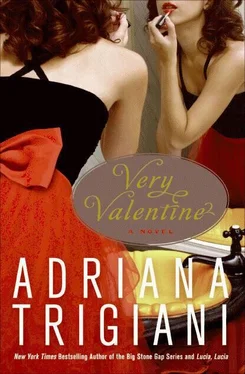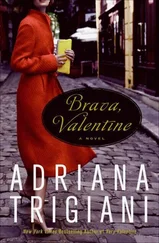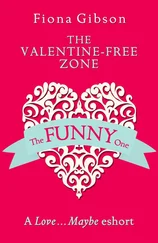“I’m taking Papa and your grandmother up to Anacapri today,” Gianluca says as he goes out the door. Antonio waits on a customer as I pull the work stool close to Costanzo. He doesn’t seem to mind. I wasn’t entirely prepared to spend my afternoon with the shoemaker, but what else do I have to do? The thought of another solo tourist outing like the boat ride this morning is enough to make me seasick. So, I do what all Roncalli women before me have done-I make the best of it.
“How long have you been a cobbler?” I ask Costanzo.
“I was five years old. I have four brothers and we needed to learn a trade. I’m the third generation of shoemakers in my family.”
“Me, too,” I tell him.
He puts down his scalpello . “Do you make sandals?”
“Wedding shoes. In New York City.”
“Brava.” He smiles.
The walls behind Costanzo’s work space are cluttered with a collage of photographs. There are plenty of pictures of people I’ve never seen before wedged between Italian icons like Sophia Loren, on holiday and wearing flat gold leather sandals, and Silvio Berlusconi, wearing Costanzo’s loafers in navy blue. I point to a picture of Clark Gable.
“My favorite actor,” I tell him.
“Not me. I like John Wayne.”
We laugh.
“I made Clark Gable’s shoes for It Started in Naples,” he says as he picks up il martello and hammers the edge of the strap.
“What was he like?”
“Tall. Nice. Very nice.” He shrugs.
“Do you mind if I stay and watch you work?”
He smiles. “Maybe you can teach me something.”
“I don’t think so.”
“Do you design your wedding shoes or do you build other people’s designs?”
“Both. My grandfather designed six basic patterns, and now I hope to create new ones.”
“Va bene,” he says. He picks up il tricetto and takes the blade of the knife along a calfskin sole, trimming it like he’s peeling an apple. A ribbon of leather falls to the floor. He hands the sole to me, and indicates his tools on the bench. “Show me how you sew,” he says.
I take the sole, mark the points around it to place the stitching with la lesina o puntervolo. Then I pick up la bucatrice and punch a series of holes where I made the markings. I pull a thick needle from his pincushion (a velvet tomato, just like Gram’s!) and thread it with a sturdy but thin skein of beige hemp. I knot the end cleanly and pull it through the hole at the heel first, working along the side to the toes, and then down the other side. The process takes me about three minutes. “Fast. Good.” Costanzo nods.
I spend the rest of the afternoon at Costanzo’s side. I hammer and sew. I cut and scrape. I buff and polish. I do whatever he asks me to do. I appreciate the work; it keeps my mind off what was supposed to be my vacation.
I lose track of the time until I look up and see the pale blue of twilight settling over the cliffs. “You come for dinner,” Costanzo invites me. “I have to thank you.”
“No, I appreciate that you’re letting me work with you. Here’s how you can thank me.”
Costanzo looks at me and smiles.
“May I please come back tomorrow?” I ask him.
“No. You go to the beach. You rest. You’re on holiday.”
“I don’t want to go to the beach. I’d rather come back and work with you.” I’m surprised to hear myself say it, but the minute I do, I know the words are true.
“I must pay you.”
“No. You can make me a pair of sandals.”
“Perfetto!”
“What time do you open?”
“I’m here at five A.M.”
“I’ll be here at five.” I sling my tote bag over my arm and go out into the piazza.
“Valentine!” Antonio calls after me. “Thank you.”
“Oh, are you kidding? Mille grazie. Your dad is amazing.”
“He never lets anyone sit with him. He likes you. Papa doesn’t like anyone,” Antonio laughs. “He’s besotted.”
“I have that effect on men. See you tomorrow,” I tell him. Yes, some effect I have on men, except the one who counts, Roman Falconi.
As I walk past the tourists who climb onto their buses, talking too loudly and laughing too much, I feel more alone than ever. Maybe I’ve figured out a way to turn this disaster into something wonderful after all; I spent the day learning from a master, and I actually enjoyed myself. And, if my instincts are right, or at least better at work than they are at love, I have a feeling I have just begun to learn what I need to know from Costanzo Ruocco.
“Valentine? Andiamo,” Costanzo calls to me from the back of the shop. Costanzo was surprised when I actually showed up for work as I’d said I would. Little does he know he’s actually doing me a favor by salvaging this vacation.
I put down my work and follow the sound of his voice through the supply room and outside to a patio garden where there is a small table and four chairs. A white cotton tablecloth covers the table, anchored from blowing away in the Capri breezes by a pot of fragrant red geraniums.
Costanzo motions for me to sit next to him. He opens a plain tin lunch bucket and unloads the contents. He unwraps a loaf of bread from a sleeve of wax paper. Next to the bread, he places a container of fresh figs. Then he lifts out a tin of what looks like white fish covered in black olives. He pulls out two napkins. From under the table, he lifts a jug of homemade wine. He pours me a glass and then himself.
He cuts into the bread, which isn’t bread at all, but pizza alige, soft dough filled with chopped onions and anchovies. He slices the hearty pizza in thin, long slices, then places two on a plate for me. I bite into the crisp crust, which gives way to the salty anchovy, softened by the sweet onions and butter in the folds of the dough.
“Good?” he asks.
I nod emphatically that it is.
“Why did you come to Capri?” he asks me.
“It was supposed to be a vacation. But my boyfriend had problems at work and couldn’t make it at the last minute.”
“He canceled?”
“Yes.”
“When you go home, you end it, right?”
“Costanzo!”
“Well, he likes his work more than you.”
“It’s not like that.”
“I think so.”
“You know, I’m actually glad he couldn’t come here because if he had, I wouldn’t be spending time with you.”
He smiles. “I’m too old for you,” he laughs.
“That seems to be the case with most of the men I’m meeting in Italy.”
“But if I were young…” He fans his hand.
“Yeah, yeah, yeah, Costanzo.” We laugh heartily. I’m feeling genuinely happy for the first time in days.
Italian men put women first. Roman’s priorities are more American than Italian, as he puts the restaurant first. To be fair, I can’t say that I have my priorities straight, or that I’ve mastered the art of living. I live for my work, I don’t work to live. Roman and I have lost our Italian natures. We’re typical overextended, overworked Americans with the worst kind of tunnel vision. We waste the present for some perfect future we believe will be waiting for us when we get there. But how will we get there if we don’t build the connection now?
The way I live from day to day in New York City suddenly seems ridiculous to me. I’ve mortgaged my happiness for a time that may never come. I think of my brother, and the building, the Bergdorf windows, and Bret’s investors. I love making shoes. Why does it have to be more complicated than that? Costanzo walks to work, builds shoes, and goes home. There’s a rhythm to his life that makes sense. The small shop sustains Costanzo and his sons beautifully. I sip the wine. It’s rich and intense, like every color, mood, and feeling on this island.
Читать дальше












